
Transform your product design processes and personalization services with generative AI
Traditional product design can be a complex and challenging process, requiring multiple stages of ideation, modification, restyling, 3D modeling, prototyping, and testing. One of the main challenges is finding the balance between creative freedom and practical constraints, such as cost, manufacturability, and user needs. Another issue is the limited number of design options that can be explored within a reasonable timeframe, resulting in suboptimal designs.
Furthermore, the traditional product design process can be time-consuming and expensive, particularly when it comes to modeling using traditional CAD tools. Creating physical prototypes can also be very costly, and changes to the design often require starting the process over from scratch. This can lead to delays in the design process and result in higher costs for the final product.
Enter generative AI product design.
An overview of generative product design with AI
Generative AI can help to overcome some of these challenges by automating repetitive tasks and generating many potential designs. With generative AI, designers can enhance their workflow and achieve remarkable results in various stages of the design process.
Firstly, generative AI enables designers to unleash their creativity during the initial ideation phase. By setting specific parameters and constraints, designers can leverage AI models to generate thousands of potential design options. This opens up a world of possibilities and helps designers to explore innovative concepts that align with their vision.
Secondly, quick sketch visualization is made effortless with generative AI. Designers can input rough sketches or basic outlines, and the AI-powered system can generate refined visualizations that bring their ideas to life. This almost real-time feedback enables designers to iterate and refine their concepts rapidly, leading to more informed design decisions.
The generation of design variants, or restyling, is another key capability of generative AI. Designers can input a base design and use AI algorithms to automatically generate a range of design alternatives. This process allows for exploration and experimentation, ultimately leading to the discovery of novel design solutions.
Generative AI also plays a vital role in creating marketing content. By providing input such as product specifications, target audience, and desired style, designers can utilize AI models to generate high-quality images and visual representations. These generated visuals can be used in marketing materials, product catalogs, and online platforms, effectively showcasing the product's features and capturing the attention of potential customers.
Furthermore, generative AI provides your customers with unique product personalization capabilities that allow them to create stunning designs based on natural language style, color and design descriptions, and reference images.
In summary, generative AI tools offer a wide range of capabilities that greatly enhance the product design process. From initial ideation to quick sketch visualization, design variants generation, marketing content creation, and product personalization, AI enables designers to push boundaries, unlock new creative possibilities, and deliver exceptional design outcomes. By integrating generative AI into their workflow, designers can streamline their processes, achieve greater efficiency, and ultimately create innovative products that resonate with their audience.
How our starter kit works
Our Generative AI Product Design Starter Kit is designed to support a multistep workflow consisting of ideation, modification, restyling, and productization. The app includes multiple features to assist users through each step of the design process. In the following subsections, we will explain each of these steps in more detail and show how our app can help you bring your ideas to life.
Ideation functionality
The ideation phase is where designers generate a range of concepts and explore different possibilities for their product design. Our Generative AI Product Design Starter Kit provides generative AI models that enable rapid prototyping of new product designs based on sketches, and textual descriptions (prompts). With these capabilities, product designers can facilitate ideation sessions and create design variants quickly and easily.
The app has two functionalities to support the ideation phase:
- “Design from text prompt”; and
- “Design from sketch image and text prompt”.
The first functionality is based on Stable Diffusion, a deep learning text-to-image model, that enables generating product designs from textual prompts. With this feature, designers can quickly iterate on multiple design ideas and explore different possibilities.

The second ideation functionality creates new designs from sketch image and text prompt, and is based on ControlNet, a neural network structure that controls the Stable Diffusion model, to generate product designs from sketches and textual descriptions.
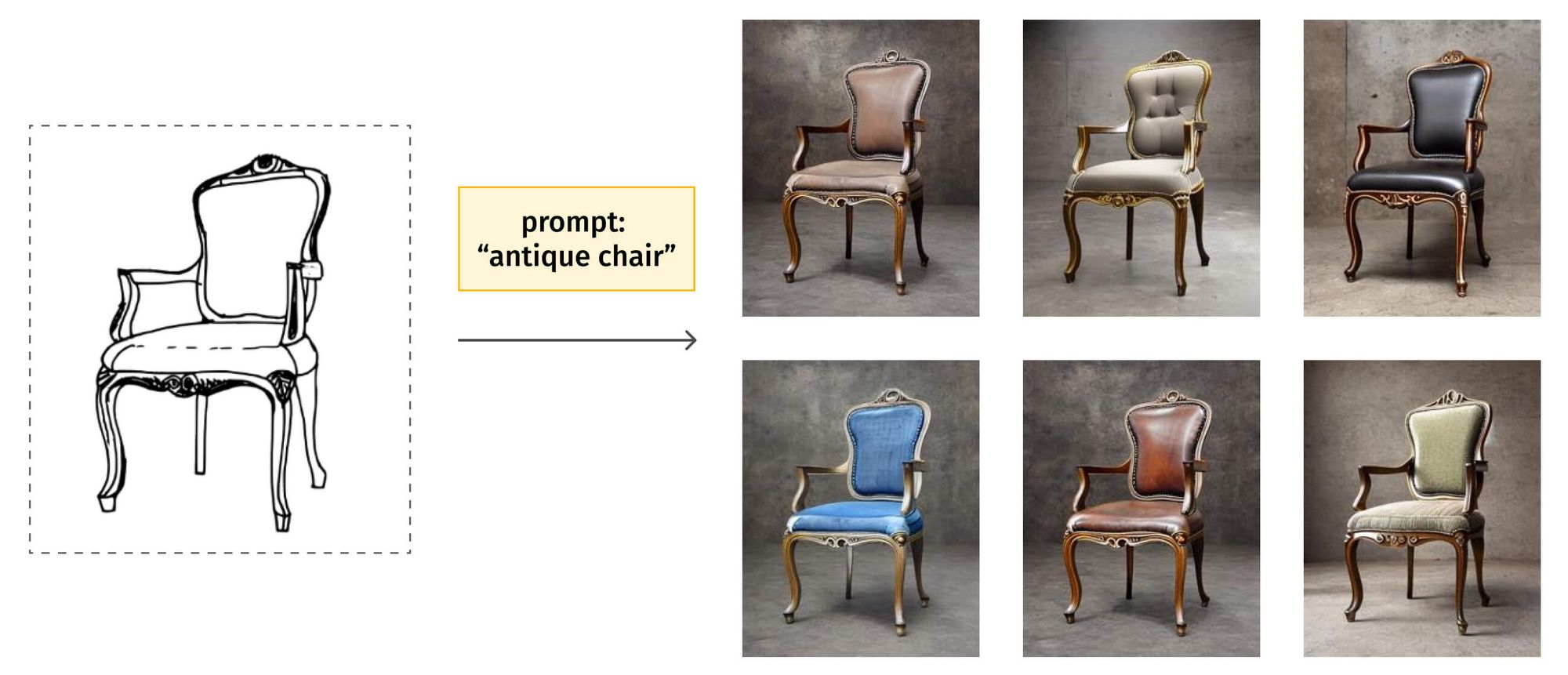
This enables designers to leverage both visual and textual cues to create product designs that accurately reflect their vision. Overall, the ideation phase is critical to the success of any product design project. Our Generative AI Product Design Starter Kit's generative AI models make it easier and faster for designers to generate and evaluate multiple design ideas, helping to accelerate the ideation process and arrive at optimal design solutions more quickly.
Modification functionality
The modification functionality in our Generative AI Product Design Starter Kit allows designers to fine-tune object shapes and styles, enabling quick customizations of initial designs. This functionality is particularly useful when creating customized products or allowing customers to personalize existing products.
Our app includes two possibilities for modification:
- “Masked inpainting”; and
- “Masked conditional inpainting”.
With “Masked inpainting”, designers can draw a mask for a specific area they want to modify, by using a drawing tool from our app, and remove or modify the selected area. This functionality is achieved with LaMa (short for Large Mask Inpainting), an inpainting network architecture that uses Fast Fourier Convolutions.
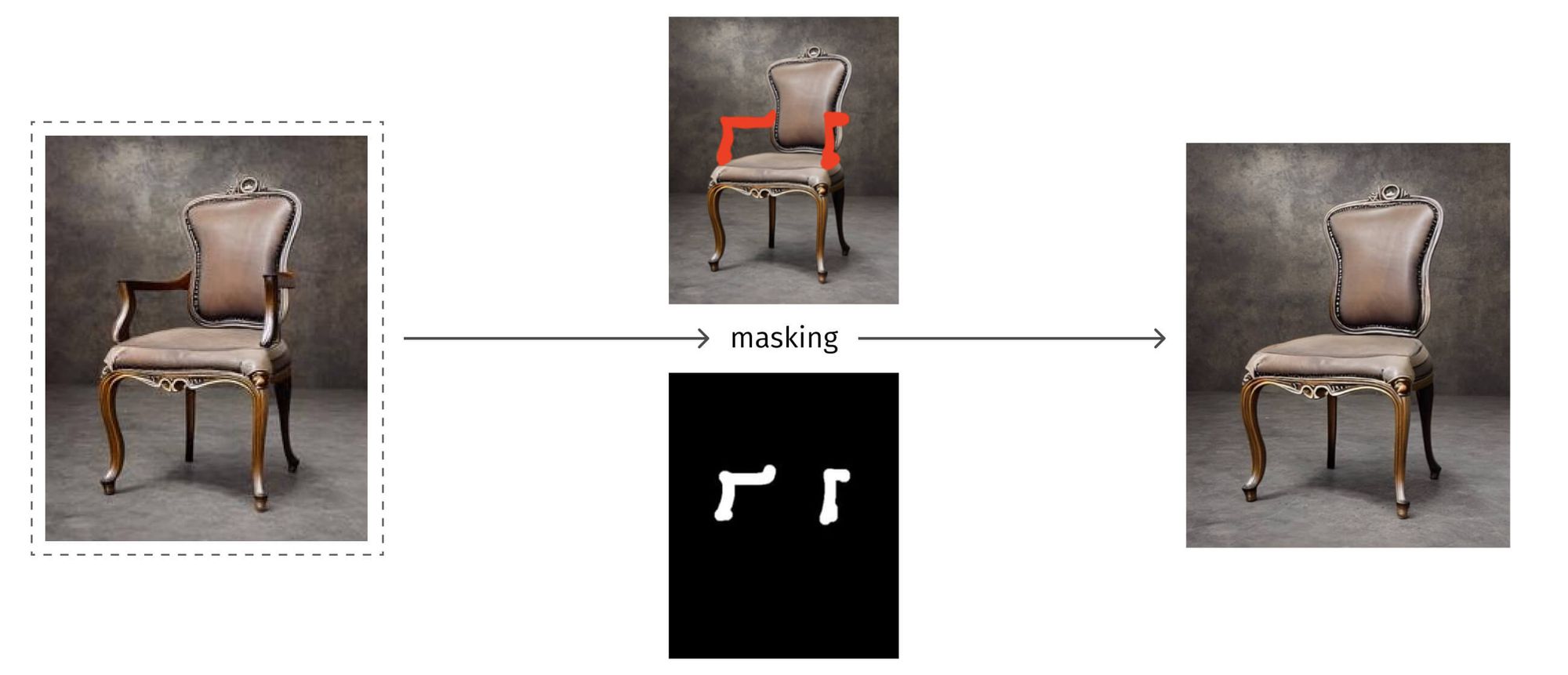
With “Masked conditional inpainting”, designers can modify the design based on a combination of masked inpainting and textual prompts. To do this, our app uses the Stable Diffusion model in combination with the masked inpainting technique to generate a modified image.
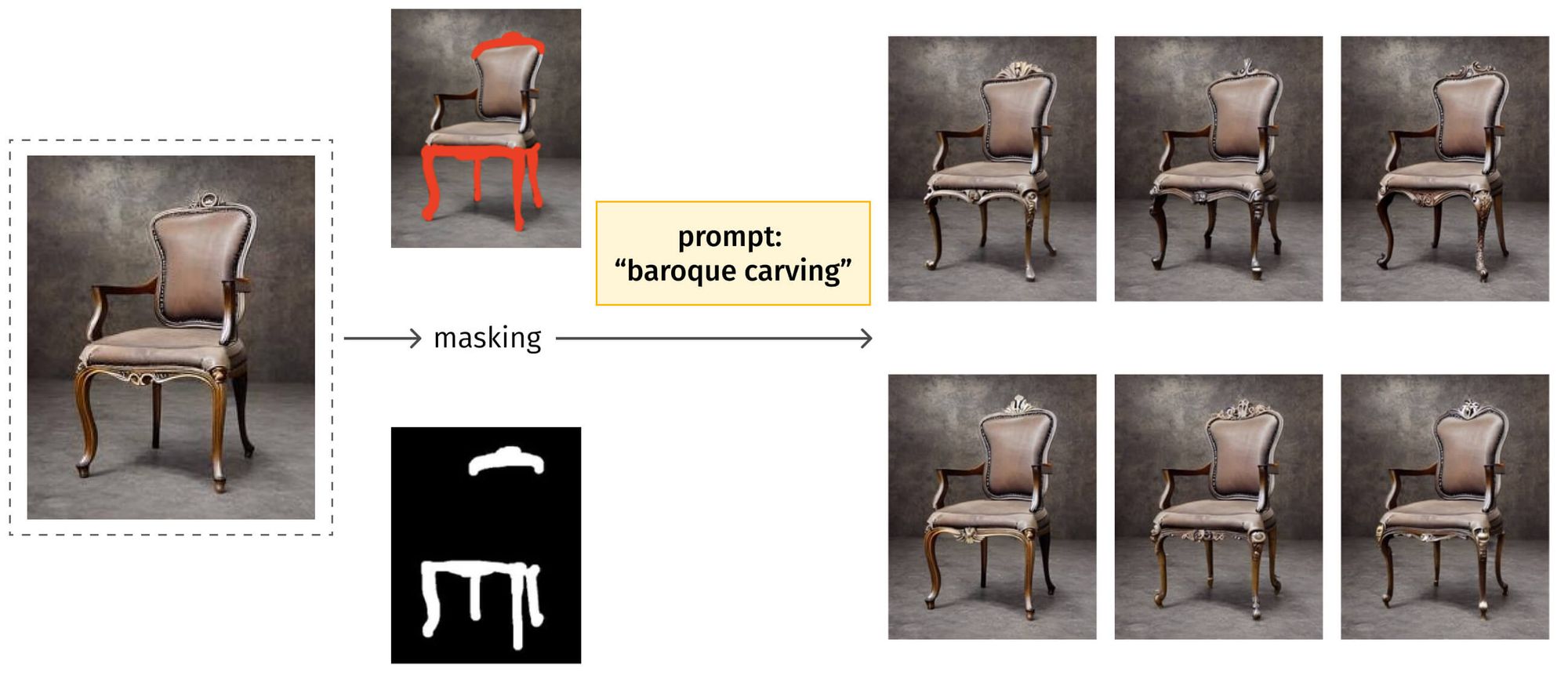
These mentioned functionalities enable designers to quickly and easily modify their product designs without starting from scratch, helping them to save time and resources. Additionally, by creating customer-facing design tools that leverage these functionalities, businesses can empower their customers to edit products and create personalized designs, leading to increased customer engagement and loyalty.
Restyling functionality
The restyling functionality in our Generative AI Product Design Starter Kit enables designers to change product texture, style, and even lighting conditions without altering the underlying shape of the product. This feature is particularly useful for creating customer-facing interfaces and personalized product designs that meet individual preferences and style choices.
Our app includes two options for restyling:
- “Style from prompt”; and
- “Style from prompt and mask”.
With “Style from prompt”, designers can modify the style of the product based on textual prompts, while “Style from prompt and mask” gives designers more control and enables them to modify specific areas of the product using a combination of image masking and textual prompts.
Under the hood, our restyling functionality is powered by two Generative AI models: Stable Diffusion and ControlNet. These models work together to generate high-quality restyled product designs quickly and easily.
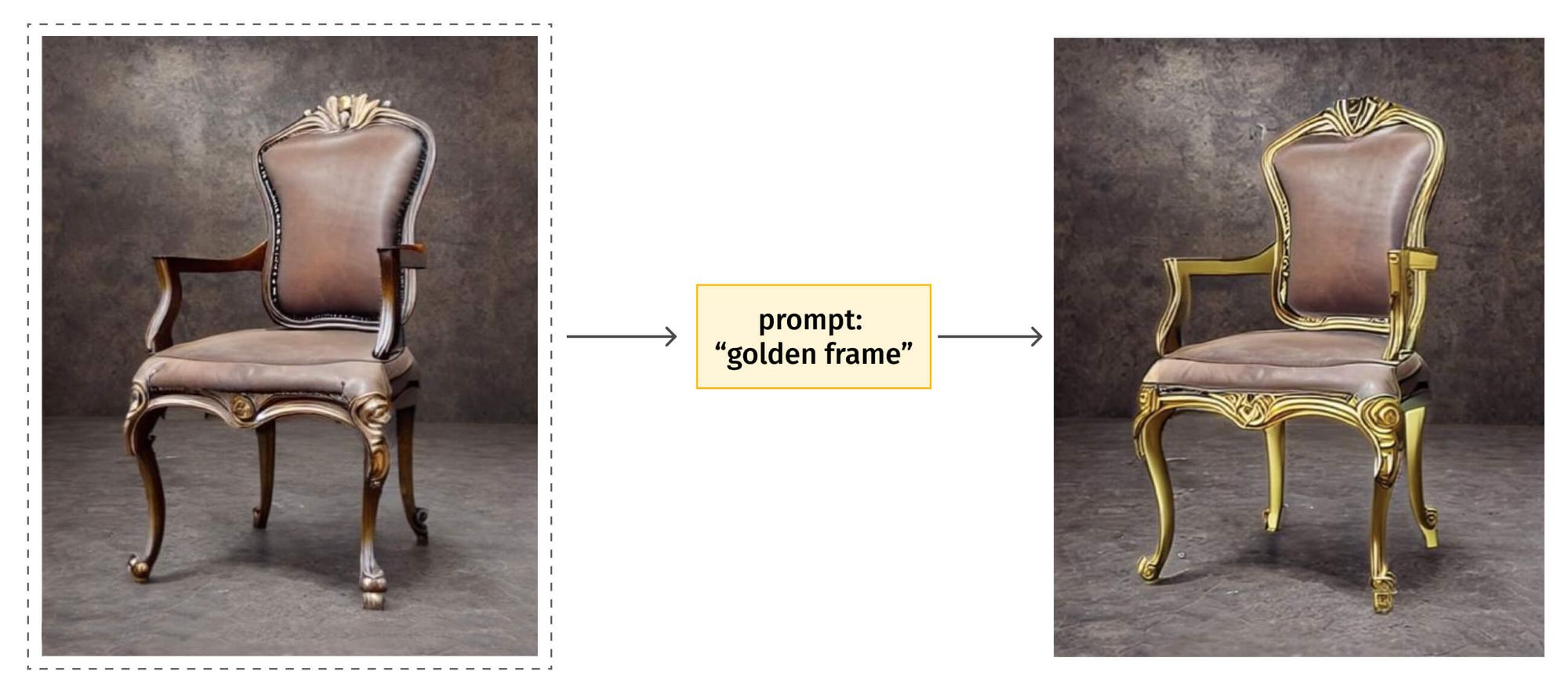
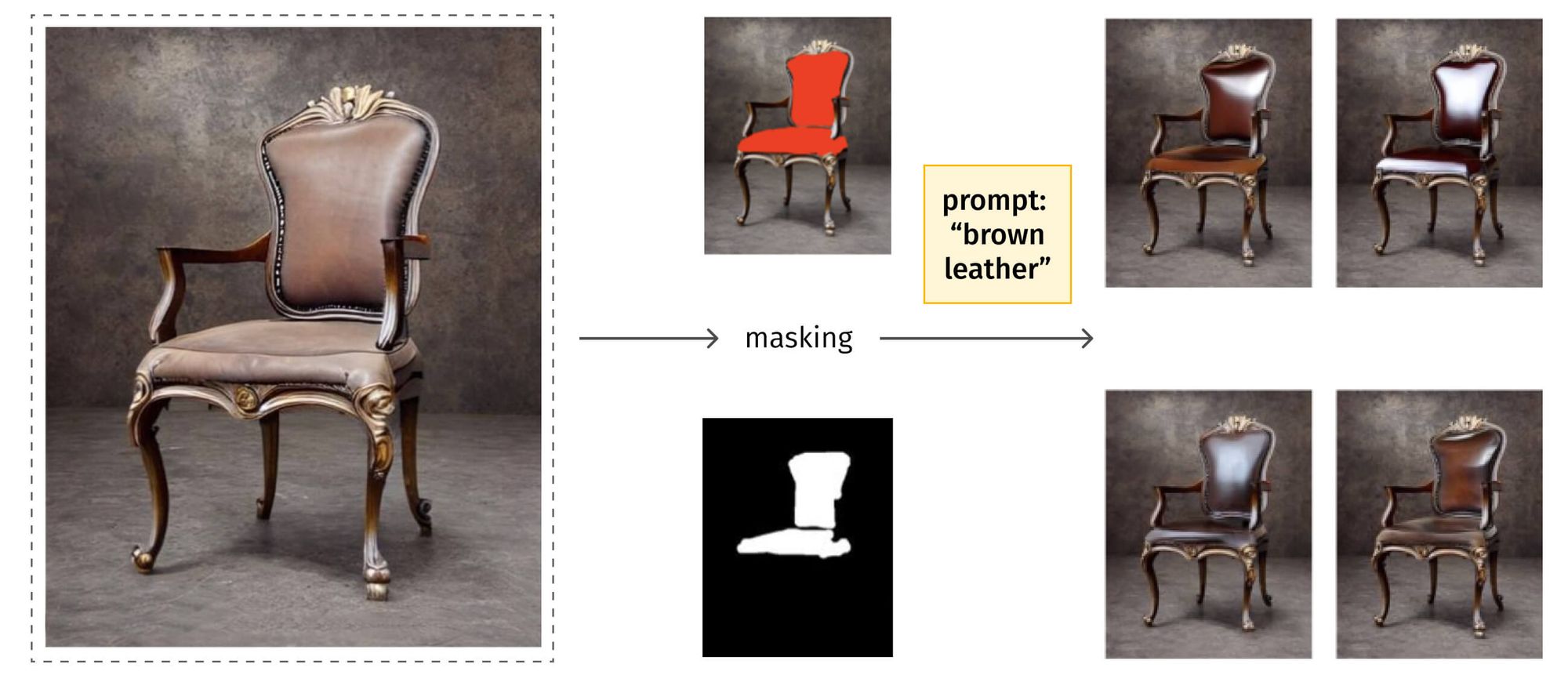
The ability to restyle products easily and quickly enables designers to create personalized designs that meet the unique needs of individual customers. This, in turn, can lead to increased customer engagement, higher levels of customer satisfaction, and increased brand loyalty.
Productization functionality
The productization functionality in our Generative AI Product Design Starter Kit includes models for rendering objects based on textual descriptions of the environment and image style. This feature allows designers and customers to preview products in different contexts and scenarios, providing a realistic representation of the final product.
In our app, this functionality is called "Final image rendering," and is powered by two Generative AI models: DIS and ControlNetInpainting. DIS is a technique for image background removal, while ControlNetInpainting is a model that enables designers to fine-tune the final product based on specific textual prompts.
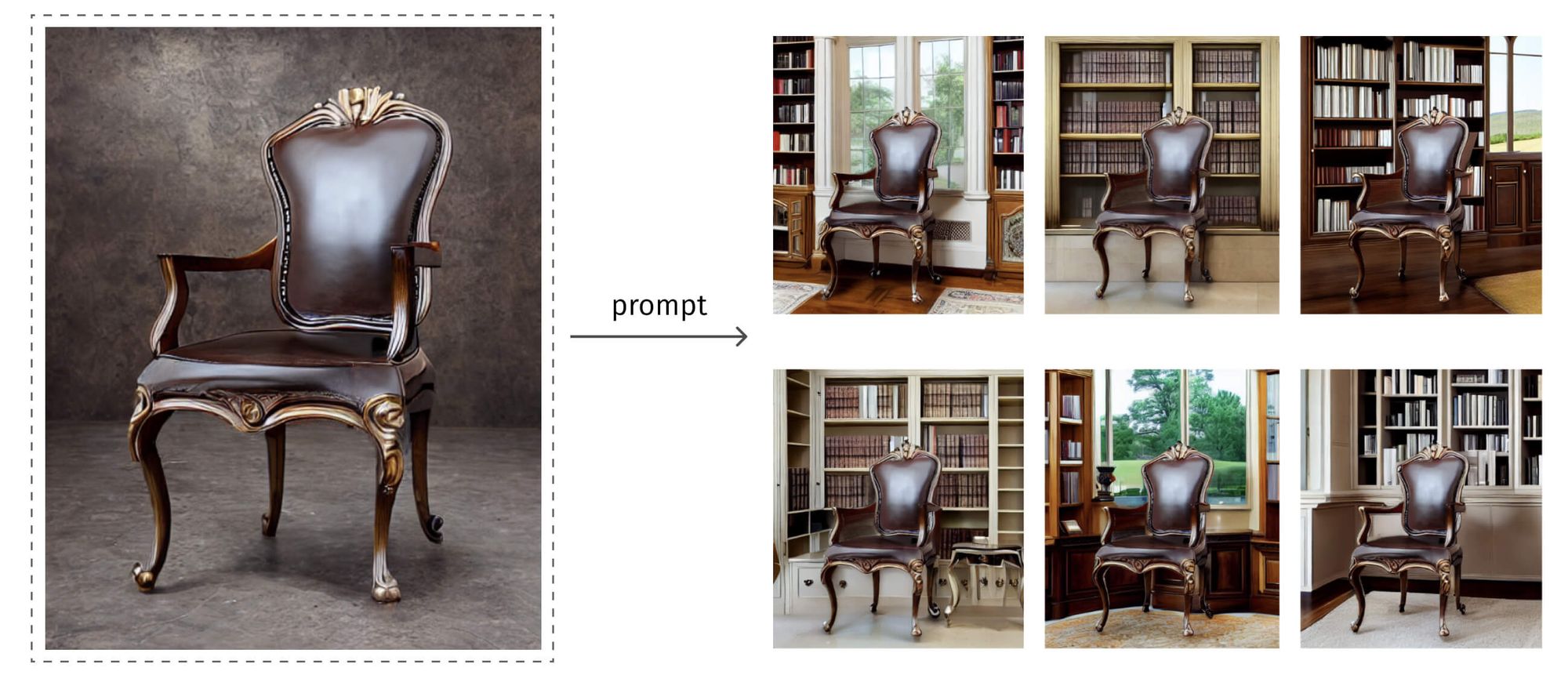
With this feature, designers can easily visualize their products in different environments, helping them to make informed decisions about color, style, and overall design. This ultimately simplifies the process of creating marketing content. Customers can also use this feature to preview products before making a purchase, giving them a better sense of how the product will look in their environment.
Overall, the productization functionality in our Generative AI Product Design Starter Kit streamlines the product design process and helps to reduce the time and resources spent on prototyping and product visualization. By providing realistic previews of products, designers can make better-informed decisions, leading to higher-quality designs and increased customer satisfaction.
Building your workflow
In addition to the specific functionalities for ideation, modification, restyling, and contextualization, the generative AI models included in our Starter Kit can be used to build arbitrary workflows for a wide range of back-office and customer-facing applications.
With the ability to generate high-quality images and designs based on input sketch images and textual prompts, and different style modification techniques, the potential applications for our generative AI models are virtually limitless. From creating custom designs for clients to generating images for marketing materials, our models can be customized to fit the needs of any industry.
Whether you are a product designer looking to streamline your workflow or a company looking to develop customer-facing tools and apps, our starter kit provides the foundation for building powerful and innovative applications using generative AI.
The starter kit is powered by Flask, a Python-based web application framework that is used to create a web application, and seamlessly integrate generative AI models and UI. The app's cloud-agnostic and containerized architecture enables effortless deployment on any cloud provider, while granting users the flexibility to customize scalability, availability, security, and cost considerations according to their specific preferences and requirements.
Overall, the flexibility and versatility of our generative AI models make them a valuable tool for businesses and individuals across a range of industries. With the ability to build customized workflows and applications, our starter kit enables users to unlock new levels of creativity and productivity.
Conclusion and benefits of generative AI product design
In conclusion, the generative AI models included in our starter kit provide a powerful solution for businesses and individuals looking to streamline the product design process. By leveraging cutting-edge deep learning models, our app enables users to create high-quality designs quickly and easily, without the need for expensive design software or specialized expertise.
The benefits of using generative AI for product design are numerous, including increased speed and efficiency, reduced costs, and greater flexibility in design workflows. With our starter kit, users can build customized applications and workflows tailored to their specific needs, and provide customers with new opportunities to customize products.
Overall, generative AI represents a breakthrough in product design, and we are excited to be at the forefront of this exciting field. With our starter kit, businesses and individuals alike can harness the power of generative AI to create innovative designs and personalize customer experiences.
Learn more about generative AI applications across industries:

